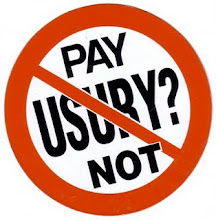Credit Card Debt Trap Is Usury
I also shared that the value of credit card accounts at least 30 days late was up 26% from the previous year, to $17.3 billion. Serious delinquencies among some of the biggest lenders rose by 50 percent or more in the value of accounts that were at least 90 days delinquent. All these late fees mean that banks continued to charge exorbitant interest rate charges of 24 to 30% as they still do today ~ which amounts to USURY.
But Making matters worse ~ just as with mortgage debt, credit card debt has been put into pools that are then resold to investment houses, other banks and institutional investors. About 45 percent of the nation’s $900-plus billion in credit card debt has been packaged into these pools, and so many companies, not just a few, are at risk of being forced out of business by credit card debt write-offs.
Why do you think that American Express has become a Bank holding company ~ so they could have access to Hank Paulson's and now Geithner's bailout dollarshttp://blogs.salon.com/0002255/2008/12/02.html
So why is once criminal Usury now common practice?
Brett Weiss, Maryland Bankruptcy Blog answers this question in his article Whatever Happened to Usury Laws?
" Usury is defined in Webster's as, "the lending or practice of lending money at an exorbitant interest."
All states, including Maryland, have laws prohibiting usury-in Maryland, the default rate of interest is 6%, and most loans cannot exceed 24%. So how is it that many credit cards have annual rates of 30% or more? How is it that payday loans and tax refund loans have interest rates over 300%?
The answer lies in the federal National Bank Act and a series of Supreme Court decisions.
The National Bank Act, first adopted in 1863, provides for the establishment and regulation of national banks. For more than 100 years, that law was interpreted to require that even national banks can only charge interest at the rate allowed by the state in which its customer is located. In 1978, the Supreme Court changed everything.
In Marquette National Bank v. First of Omaha Corp., it ruled that a national bank can charge its customers, no matter where they are located, interest at the rate allowed by the state in which it is located. Even though the customers in Marquette were located in Minnesota, the fact that the bank was centered in Nebraska allowed it to charge its Minnesota customers the higher Nebraska interest rate.
Shortly after Marquette was decided, North Dakota pretty much repealed its usury statutes. National Banks descended like a horde of locusts on that state, establishing their main offices there. CitiBank was the first, and others followed its lead. North Dakota's interest rate cap ( or the lack of an interest rate cap ) became the de facto national interest rate on credit cards.
Ever wonder why so many of your credit card payments are sent to North Dakota? This is why.
The practical effect of Marquette was to repeal every state's usury laws insofar as they deal with national banks. And any lender that wants to charge exorbitant interest and still follow the letter need only form a national bank, and the sky's the limit. http://www.bankruptcylawmaryland.com/blog/whatever-happened-to-usury-laws/#more-42
According to Harvard Law Professor Elizabeth Warren, the credit card companies are misleading consumers and making up their own rules. "These guys have figured out the best way to compete is to put a smiley face in your commercials, a low introductory rate, and hire a team of MBAs to lay traps in the fine print," Warren tells FRONTLINE. http://www.pbs.org/wgbh/pages/frontline/shows/credit/view
Warren and other critics say that a growing share of the industry's revenues come from what they call deceptive tactics, such as default terms spelled out in the fine print of cardholder agreements ~ the terms and conditions of which can be changed at any time for any reason with 15 days' notice.
"Banks are raising interest rates, adding new fees, making the due date for your payment a holiday or a Sunday on the hopes that maybe you'll trip up and get a payment in late," says Robert McKinley, founder and chairman of Cardweb.com and Ram Research, a payment card research firm. "It's become a very anti-consumer marketplace."
In September 2008, the Credit Cardholders’ Bill of Rights Act was passed overwhelmingly by the House of Representatives with bipartisan support ~ a vote of 312 to 112, with 84 Republicans joining Democrats to support the bill. Unfortunately, the Senate did not have time to take up the bill before the end of the recent legislative session. Although the Federal Reserve and other bank regulators issued a rule in December 2008 that would prohibit many of the same unfair practices, the rule does not take effect until July 2010, giving credit card companies 18 months to proceed unchecked and delaying relief for millions of American consumers.
The Credit Card Debt Trap has become USURY and immediate steps must be taken to protect consumers from this continuing unfair practice by greedy banks ~ many of whom are receiving bailout funds.
NOTE: This article is originally published at this website:
http://www.thepeoplesvoice.org/TPV3/Voices.php/2009/04/09/credit-card-debt-trap-is-usury



0 Comments:
Post a Comment
<< Home